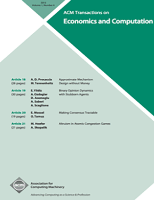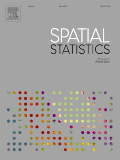
NETWORKS & SPATIAL ECONOMICS
metrics 2024
Illuminating the Pathways of Economic Connectivity
Introduction
NETWORKS & SPATIAL ECONOMICS, published by SPRINGER, stands at the forefront of research within the disciplines of artificial intelligence, computer networks, and software engineering. With an ISSN of 1566-113X and E-ISSN 1572-9427, this esteemed journal boasts an impressive impact factor and is recognized in the Q2 and Q3 quartiles in its respective categories for 2023. As a vital resource for researchers and professionals, it offers a dynamic platform for disseminating innovative findings that explore the intersections of spatial economics and network theory. The journal has evolved significantly since its inception in 2005, with its convergence period extending to 2024, showcasing its commitment to advancing scholarly discourse and providing access to critical advancements in the field. Aimed at academics, practitioners, and students alike, NETWORKS & SPATIAL ECONOMICS is essential for anyone seeking to deepen their understanding of how spatial frameworks and network dynamics influence economic systems.
Metrics 2024
 0.59
0.59 1.60
1.60 2.10
2.10 59
59Metrics History
Rank 2024
Scopus
IF (Web Of Science)
JCI (Web Of Science)
Quartile History
Similar Journals

Mathematics and Financial Economics
Pioneering Research in Quantitative Finance and EconomicsMathematics and Financial Economics, published by Springer Heidelberg, is a leading peer-reviewed journal that explores the intersections of mathematical theories and financial practices. With an ISSN of 1862-9679 and an E-ISSN of 1862-9660, the journal has made notable contributions to its field since its inception in 2007, with a convergence period extending until 2024. Positioned in the prestigious Q2 category for both Finance and Statistics and Probability, the journal is ranked within the top 66th percentile in Mathematics and Statistics and the 62nd percentile in Decision Sciences according to Scopus metrics. Researchers and professionals looking for high-quality, innovative research in mathematical finance will find valuable insights within its pages. Although primarily a subscription-based journal, it aims to foster knowledge sharing among academia and industry experts. Its commitment to advancing quantitative methods and financial applications solidifies its importance as a resource for students, researchers, and practitioners dedicated to understanding and navigating the complex dynamics of financial markets.

ACM Transactions on Economics and Computation
Navigating Complexities: Where Economics Meets ComputationACM Transactions on Economics and Computation, published by the Association for Computing Machinery, is a premier scholarly journal that bridges the fields of economics and computation. With an ISSN of 2167-8375 and an E-ISSN of 2167-8383, this journal has carved out a significant niche since its inception in 2013, and is set to run through 2024. Its multidisciplinary scope encompasses various quarters, being ranked Q1 in Computer Science (miscellaneous) and Q2 in Computational Mathematics, Economics and Econometrics, Marketing, and Statistics and Probability as of 2023. The journal not only ranks impressively in Scopus—positioned within the top 25% for several categories—but also fosters a collaborative environment where researchers, professionals, and students can engage with cutting-edge research that showcases innovative methodologies and theoretical advancements. Although it is not open access, the journal remains vital for advancing knowledge at the intersection of computation and economics, making it an essential resource for those looking to understand the complexities of these dynamic fields.

Geo-Spatial Information Science
Pioneering Research at the Crossroads of Geography and ComputingGeo-Spatial Information Science, published by TAYLOR & FRANCIS LTD, is a premier open-access journal that has been at the forefront of disseminating cutting-edge research since its inception in 1998. With an ISSN of 1009-5020 and an E-ISSN of 1993-5153, this journal plays a pivotal role in the fields of Computers in Earth Sciences and Geography, Planning and Development, achieving a prestigious Q1 ranking in both categories as of 2023. Its exemplary Scopus rankings highlight its relevance within the social sciences and earth sciences, placing it among the top echelons of its field, with a 95th and 93rd percentile respectively. The journal aims to bridge the gap between innovative geospatial technologies and their applications in real-world scenarios, fostering interdisciplinary collaboration and advancing the global understanding of spatial data analysis. Based in the United Kingdom, Geo-Spatial Information Science invites researchers, professionals, and students to contribute and access research that shapes the future of geo-spatial sciences, all while adhering to open access principles that ensure broad dissemination and engagement with the broader academic community.

Journal of Spatial Information Science
Transforming Data into Knowledge Across DisciplinesThe Journal of Spatial Information Science is a premier open-access journal published by the University of Maine, dedicated to advancing research in the interdisciplinary fields of spatial information science, geography, and computer science. With an ISSN of 1948-660X, this journal has established itself as a significant contributor to the academic community since its inception in 2010, achieving notable rankings as evidenced by its classification in the Q2 quartile across multiple categories, including Computers in Earth Sciences and Geography. The journal offers a platform for innovative research, fostering collaboration and knowledge dissemination among researchers and practitioners. Its impact is further underscored by its Scopus rankings, placing it in the top percentiles across critical disciplines. With Open Access options available, the Journal of Spatial Information Science ensures that high-quality research is accessible to a broader audience, promoting the ongoing development of the field through thoughtful and rigorous academic inquiry.

Reports on Geodesy and Geoinformatics
Fostering collaboration in the realm of geospatial sciences.Reports on Geodesy and Geoinformatics, an esteemed scholarly journal published by SCIENDO, stands as a vital platform in the field of geodesy, geoinformatics, and related sciences. With an ISSN of 2391-8365 and E-ISSN 2391-8152, this open-access journal has been providing free access to impactful research and advancements in the domain since 2013. Located in Warsaw, Poland, at Bogumila Zuga 32A, Mazovia 01-811, it aims to disseminate high-quality research articles, case studies, and reviews that are crucial for academics, industry professionals, and students alike. The journal's commitment to promoting innovative methodologies and technological advancements reinforces its position as an important resource for fostering collaboration and knowledge sharing across global communities in geodesy and geoinformatics.

TIJDSCHRIFT VOOR ECONOMISCHE EN SOCIALE GEOGRAFIE
Advancing Insights into Economic and Geospatial DynamicsTIJDSCHRIFT VOOR ECONOMISCHE EN SOCIALE GEOGRAFIE, an esteemed journal published by WILEY, provides a premier platform for the dissemination of cutting-edge research within the fields of economics and social geography. With an ISSN of 0040-747X and an E-ISSN of 1467-9663, this journal has established itself as a pivotal resource, exhibiting a remarkable Q1 ranking in both Economics and Econometrics as well as Geography, Planning and Development for 2023. Notably, it is positioned in the 95th percentile among 821 journals in its category of Social Sciences, and ranks 46th among 716 in Economics and Econometrics, underscoring its influential role in shaping academic discourse. The journal, which has been in publication since 1967 and is anticipated to run through 2024, invites contributions that explore the intricate interplay between economic phenomena and social geospatial dynamics. Researchers, professionals, and students are encouraged to engage with its findings, which are crucial for understanding contemporary socio-economic challenges and innovations on a global scale.

Complex Systems
Bridging Disciplines to Decode ComplexityComplex Systems is a pivotal journal published by Complex Systems Publications Inc, specializing in the interdisciplinary field of complex systems science. With an ISSN of 0891-2513, it focuses on advancing the understanding of complex phenomena across various domains, including computer science and control engineering. Operating from the United States, this journal has established itself as a credible source with a current impact factor reflecting its relevance—ranking in the Q3 category for both Computer Science (miscellaneous) and Control and Systems Engineering as of 2023. Although it does not offer Open Access, Complex Systems aims to facilitate the exchange of cutting-edge research and innovative methodologies, making it indispensable for researchers, professionals, and students eager to explore and contribute to the field. With coverage spanning from 2012 to 2024, it strives to foster a deeper understanding of the principles governing complex systems, thus paving the way for future technological advancements and theoretical developments.

Applied Network Science
Advancing interdisciplinary connections in network science.Applied Network Science is a premier open access journal published by SpringerNature that has been a vital resource in the fields of computational mathematics and computer networks since its inception in 2016. With an impressive Q1 ranking in Multidisciplinary fields and Q2 rankings in both Computational Mathematics and Computer Networks and Communications, it distinguishes itself as a significant contributor to interdisciplinary research efforts. The journal fosters innovative methodologies and applications within network science, making it a crucial platform for researchers, professionals, and students alike. With an E-ISSN of 2364-8228 and a commendable standing in global rankings, it supports a broad audience through its commitment to open access, ensuring that groundbreaking research is readily available. Located in Switzerland, Applied Network Science continues to shape the landscape of network research and communication, making substantial impacts across various domains.

Spatial Statistics
Connecting Statistics with Spatial RealitiesSpatial Statistics is a premier journal published by ELSEVIER SCI LTD, focusing on innovative methodologies and applications in the realm of statistical analysis within spatial contexts. With an ISSN of 2211-6753, the journal has established itself as a significant contributor in its field since its inception in 2012, and continues to thrive, with its next volume projected through 2024. It holds a respectable Q2 ranking across several categories, including Computers in Earth Sciences, Management, Monitoring, Policy and Law, and Statistics and Probability, affirming its impact and relevance to researchers and professionals alike. The journal's commitment to publishing high-quality research enables scientists to advance understanding of spatial phenomena, facilitating informed decision-making in various applications ranging from environmental science to urban planning. As part of a robust academic community, Spatial Statistics invites submissions that push the boundaries of conventional statistical techniques, ensuring that the latest findings contribute significantly to the discipline's body of knowledge.

PAPERS IN REGIONAL SCIENCE
Fostering collaboration for impactful regional science.PAPERS IN REGIONAL SCIENCE, published by Wiley, is a leading international journal dedicated to advancing the understanding of regional science and interdisciplinary approaches to geography and environmental planning. With an impressive impact factor and a prestigious Q1 ranking in both Environmental Science and Geography, Planning and Development, this journal serves as a critical platform for disseminating high-quality research from 1955 to 2024. Covering a diverse scope including regional development, spatial analysis, and environmental issues, it facilitates discussion and knowledge exchange among scholars and practitioners. The journal is recognized for its rigorous peer-review process and its commitment to addressing pressing societal challenges through research. As a vital resource for researchers, professionals, and students alike, PAPERS IN REGIONAL SCIENCE fosters innovation and collaboration within the field, contributing to a deeper understanding of the complexities of regional systems.